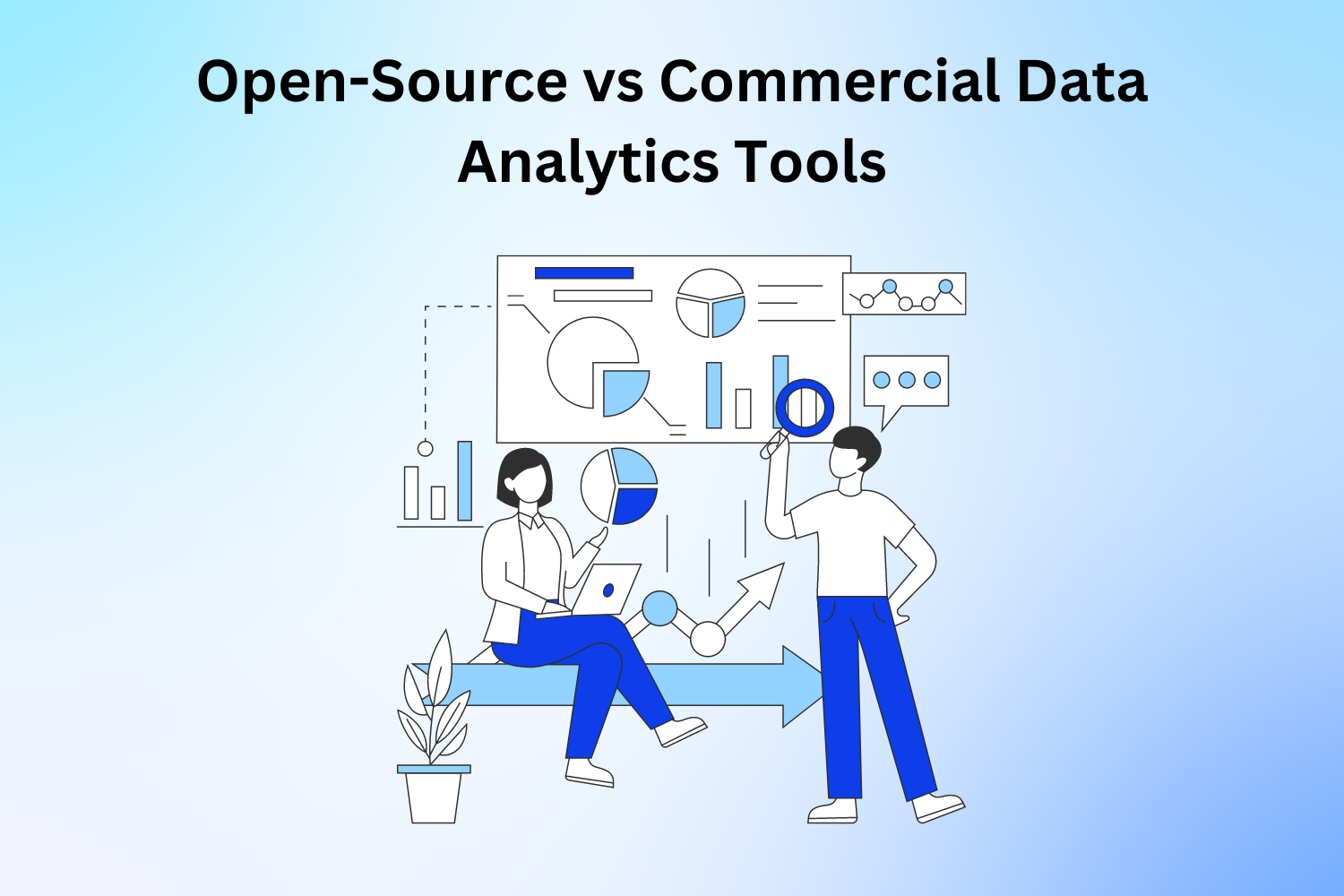Data analytics tools are indispensable for organisations as they help to provide valuable insights from analysing data. Organisations can choose whether they need to use commercial Data Analytics Tools or open-source alternatives for their analysis process. Professionals can join Data Analytics Courses and use them effectively for their organisations.
This blog discusses Open-Source and Commercial Data Analytics Tools to help professionals choose between them.
Table Of Contents
- Open-Source Data Analytics Tools
- Commercial Data Analytics Tools
- Factors to Consider
- Conclusion
Open-Source Data Analytics Tools
Open-source data analytics tools are those that anybody can download and use without paying anything. Their openness, personal ability, and adaptability result from the community of developers and users working together to create them. The most widely used open-source data analytics technologies include Hadoop, Spark, R, Python’s Pandas and NumPy libraries.
Let’s see the pros of Open-Source Data Analytics Tools below:
Cost Effective
Open-source solutions are free to use and are considered an excellent choice for startups.
Community Support
A strong community of developers and users constantly works on these tools. They can add new features, fix bugs, and generally improve them.
Flexibility and Customisation
Users’ abilities to alter and personalise open-source technologies to meet their unique demands, processes, and data processing demands provide greater adaptability and control.
Let’s see the cons of Open-Source Data Analytics Tools below:
Complexity
Some open-source tools may have a steeper learning curve, requiring technical expertise and resources for implementation, configuration, and maintenance.
Lack of Official Support
Community assistance is excellent but might not be as responsive or dependable as official customer support from commercial tool providers. This is because there is no formal support.
Commercial Data Analytics Tools
Vendors and businesses offer commercial data analytics tools, which are proprietary software solutions, for a price. These programmes usually include official support, training, and documentation. Commercial data analytics solutions are available in SAS, Tableau, Microsoft Power BI, and IBM Cognos.
Let’s see the pros of Commercial Data Analytics Tools below:
Professional Support
Commercial data analytics solutions guarantee prompt assistance, dependability, and knowledge thanks to their professional support, training programmes, and devoted customer service.
Advanced Features
To meet the demands of complicated data analysis, these tools may provide advanced capabilities, visualisations, and integrations that are not easily accessible in open-source alternatives.
Let’s see the cons of Commercial Data Analytics Tools below:
Cost
For some organisations, especially startups and small enterprises, the upfront costs of commercial tools are challenging. The cost, including description plans, one-time purchases, or licensing fees can be considered.
Vendor Lock-In
Using commercial solutions might limit your flexibility and interoperability with other systems or data sources outside the vendor’s ecosystem, known as vendor lock-in.
Factors to Consider
Features and Functionality
Consider your company goals and decision-making processes as you rank the importance of various features, functionality, and data analysis skills. For streamlined operations and well-informed decisions, you need features like powerful analytics algorithms, visualisation tools, data integration choices, and software system compatibility.
Scalability and Integration
As you plan its integration, consider how well the data analytics tool can scale to deal with increasing data quantities. Check that it can work in tandem with all of the other systems, databases, and data sources already set up in your company. A tool must be able to scale and integrate well to handle growing data demands and keep data consistent across platforms.
Support and Maintenance
Compare and contrast the commercial and open-source tool vendors’ support, documentation, updates, and maintenance offerings. Ensure the vendor you choose has solid customer support, thorough documentation to help with training and troubleshooting, software updates to fix bugs and security issues, and dependable maintenance services to keep the tool running well and for a long time. Think about whether there are user groups or forums where people may go to get further help and advice.
Conclusion
There are several considerations when deciding between commercial and open-source data analytics tools. These include available resources, level of technical knowledge, functionality, scalability, and the need for support. Compared to commercial tools, open-source ones are more affordable, flexible, and supported by a community of users; nevertheless, commercial solutions offer more functionality, expert assistance, and more straightforward navigation. Your data analytics aims and company objectives can be better met by taking stock of your organisation’s priorities and requirements before making a final selection. For more information visit the website: The Knowledge Academy.

Founder Dinis Guarda
IntelligentHQ Your New Business Network.
IntelligentHQ is a Business network and an expert source for finance, capital markets and intelligence for thousands of global business professionals, startups, and companies.
We exist at the point of intersection between technology, social media, finance and innovation.
IntelligentHQ leverages innovation and scale of social digital technology, analytics, news, and distribution to create an unparalleled, full digital medium and social business networks spectrum.
IntelligentHQ is working hard, to become a trusted, and indispensable source of business news and analytics, within financial services and its associated supply chains and ecosystems































